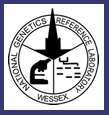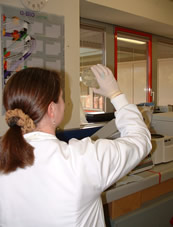
_
|
||||||||||||||
|
Mutation
scanning for BRCA1, BRCA2, hMLH1 and MSH2
|
||||||||||||||
|
NHS genetic diagnostic laboratories perform thousands of tests every month using a variety of technologies. Laboratories generally utilise locally developed controls as standards to confirm that the assay is working correctly. Consequently there is a degree of variation in the number and type of controls employed in different laboratories which could potentially compromise quality assurance. To address this problem NGRL Wessex have generated sets of plasmid constructs that harbour defined sequence changes and which can be used as controls for a wide range of mutation assays. The following reagents are currently available to UKGTN laboratories free of charge on request. Enquiries from other centres or commercial organisations should be made to Dr Helen White (hew@soton.ac.uk).
The controls are supplied as plasmid mixes with each plasmid diluted to 104 copies/µl in 0.1XTE containing 50µg/ml tRNA as a carrier. This dilution is equivalent to the copy number found in 100ng genomic DNA and therefore the plasmids should not pose a contamination threat greater than patient DNA samples. However, laboratories may feel more comfortable pipetting these reagents with plugged aerosol resistant tips and the usual precautions should be taken to ensure that the stocks do not contaminate pre PCR areas. We recommend that the plasmid stocks should be centrifuged for 1 minute at 14,000rpm (to eliminate aerosols), aliquoted (100µl) and stored at -20°C. A working aliquot can be kept at 4°C.
|
||||||||||||||
Last Updated: 30 July, 2008 by G. Watkins. |
